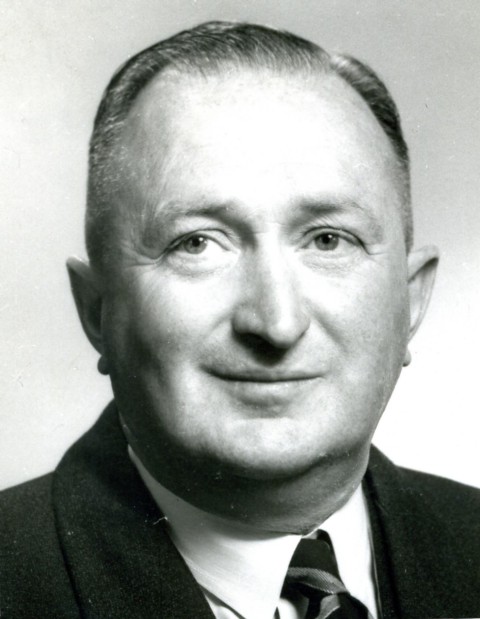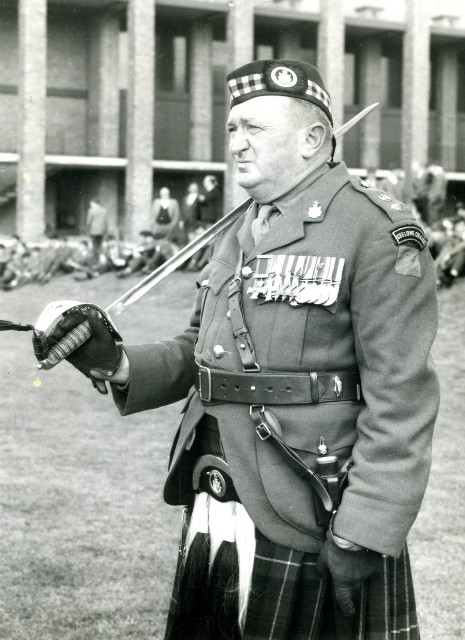
Lt Col H E Dunkley
Geelong College Staff member and soldier, Harry Dunkley, was born at Creswick, the son of a mounted policeman, Edwin Ewen Dunkley and Priscilla nee Williams. Harry first attended North Creswick State and Ballarat High Schools before training as a teacher at Melbourne Teachers’ College in 1933-4. As a trainee teacher he was first at Sebastopol Primary School before his appointment as a teacher to Geelong College in 1935. On 18 November, 1939, he enlisted in the 2nd AIF and, on 27 November, was commissioned lieutenant of the 2/6th Battalion becoming Battalion Intelligence Officer. He had, as a student, earlier served in the 8th Battalion Militia from 1927 to 1933 becoming a corporal, and by 1937, lieutenant of the Senior Cadets. In 1940, with the 2/6th Battalion, he embarked for the Middle East, where he was awarded the Military Cross
‘for courage and devotion to duty at Bardia from 28 December 1940 until 2 January 1941' . In 1941 and 1942, he served in Greece and Syria and, after posting as Adjutant to the 2/7th Battalion, was promoted Captain in 1942. After a period in Ceylon (Sri Lanka) and Australia he was sent to New Guinea and promoted to major and seconded to 17th Brigade Headquarters. On 11 September, he was severely wounded in the chest and invalided back to Australia.
During his period of convalescence in Australia he married Grace Stuart nee McCutchan, a fellow student teacher, who would later also teach at the Geelong College Preparatory School from 1940 to 1942.
Dunkley finally recovered from his injuries sufficiently to return to service in 1944 and was promoted Lieutenant Colonel commanding the 7th Battalion in the Solomon Islands. In early 1945, he led the unit in the Bougainville Campaign earning the Distinguished Service Order (DSO). The citation for this DSO read 'Lt-Col Dunkley carried out such a relentless policy of aggression on the Numa Numa Trail from June 1945 that enemy activities were entirely paralysed and confined solely to the defence of their skilfully sited strong points, which were systematically eliminated at remarkably low cost. Enemy killed were 164 to our own 22. He served in the Middle East and New Guinea with coolness under fire and tactical ability of the highest order.’ He was discharged in January 1946, returned to study gaining a BA from Melbourne University and in 1947 recommenced at Geelong College.
David Dexter in
The New Guinea Offensives wrote extensively of Dunkley's service al Salamaua. He was Mentioned in Despatches 4 February 1944
'for exceptional service in the field in New Guinea' . Gavin Long in
The Final Campaigns wrote of his appointment and operations in Bougainville wrote:
‘In June and July, in the central sector a fresh battalion had been thrusting forward. Lt-Col H L E Dunkley, commander of the 7th Battalion which had taken over the sector on 7 June, had served with the 2/6th in its Middle East campaigns and with the 2/7th in the Wau-Salamaua operations, and was one of the increasing number of officers who had risen from the ranks to command of a battalion since the war began. His battalion was given a more active role than that permitted to its immediate predecessors. Before Dunkley took over, Savige called him in, emphasised the need to avoid unnecessary casualties, and the unpopularity of the campaign in sections of the Press. He said that he expected the battalion to inflict four times as many losses as it received'. Mark Johnston in
Fighting the Enemy quoted Dunkley:
'Japaneses soldiers were instructed not to allow themselves to be captured, and the primary reason for their refusal to surrender was the dishonour attached to it, not fear of Australian treatment of prisoners-of-war. A bemused Major Dunkley illustrated the unwillingness of men who were captured. ‘One cove tried to bite his tongue out when he was captured so he couldn't be questioned. Didn't quite succeed and retained quite a lump of it. Then tried poking his own eyes out but was tied up until he calmed down. Will probably recover his sight. They don't want to be prisoners - much'.... On Bougainville, in the last month of the war, (he) wrote of the enemy with not only sarcasm and grim humour, but respect: 'our gentle opponents live on bamboo shoots and such like eked out with very little rice and some native foods (not to mention a stray bit of steak off one of their unfortunate brethren). They fight well despite it.' His final command at war’s end was as Commandant of Fauro Islands where 29,000 Japanese prisoners of war were held for repatriation.

Lt Col H E Dunkley, circa 1975.
Harry Dunkley was appointed in charge of Social Studies. He also, in 1948, assumed command of the College Cadet Unit and infused new life and a fresh interest into what had become for some boys a somewhat burdensome obligation. He brought to his new command, firsthand knowledge of modern tactics and weapons, a wide experience of command and administration and the ability to translate realism into training. With the command came the new College Cadet uniform of Gordon tartan kilt and affiliation with the Gordon Highlanders through the Victorian Scottish Regiment. During his command the cadet unit won the Inter-Schools Championship on a record number of occasions. A colleague commented that
‘He seemed to enjoy the very idea of training young men and imparting to them a little of his vast experience and knowledge. It was just this enjoyment and interest that made it enjoyable and interesting for others. Harry Dunkley was remembered by his colleagues as a cheerful companion with an ever ready fund of unique stories which he dispensed in a fascinating manner using that very special twinkle of humour which was all his own. As in other respects his preparation, class work and assignment reviews always seemed well organized’ .
Ill-health due to his war injuries finally forced his retirement from the position of Commanding Officer of the College Cadet Unit in 1968 and two years later, his retirement from teaching altogether. Following his death from heart disease in 1979 he was interred at Highton Cemetery.
Sources: Syd Trigellis-Smith, 'Dunkley, Harry Leslie Ewen (1911 - 1979)', Australian Dictionary of Biography, Volume 14, Melbourne University Press, 1996, pp 55-56; Pegasus June 1941 p 5; Pegasus December 1943 p 67; Pegasus December 1947 p 8; Pegasus December 1968 p 12; Pegasus December 1970 p 11; Pegasus June 1971 p 14; James Affleck Geelong Collegians’ at World War II (citing: AWM Collection ‘Letters to his sister describing his postings, work and concerns and as a leader of soldiers covering periods in Puckapunyal, the Middle East and North Africa, including Battle of Bardia, Greek campaign, Tobruk. Later letters cover service in New Guinea and the Solomon Islands.’; Australian War Memorial; National Archives; David Dexter, The New Guinea Offensives; Gavin Long, The Final Campaigns; Mark Johnston, Fighting The Enemy: Australian Soldiers and Their Adversaries in World War Two).